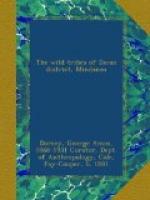In case of illness a mabalian administers some simple remedy without any call on the spirits. If, however, the sickness does not yield readily to this treatment, it is evident that the trouble is caused by some spirit who can only be appeased by a gift, Betel nuts, leaves, food, clothing, and some article in daily use by the patient are placed in a dish of palm bark and on top of all is laid a roughly carved figure of a man. This offering is passed over the body of the patient while the mabalian addresses the spirits as follows. “Now, you can have the man on this dish, for we have changed him for the sick man. Pardon anything this man may have done, and let him be well again.” Immediately after this the dish is carried away and hidden so that the sick person may never see it again, for should he do so the illness would return.
According to Father GISBERT a doll is carved from a piece of wood and the spirit is addressed: “O God, Thou who has created men and trees, and all things, do not deprive us of life, and receive in exchange this bit of wood which has our face.”
In obstinate cases the invalid may be removed from his own house to another, in order that he may be under the care of the good spirits residing there. The mabalian appplies[sic] certain medicines and then decrees a period of taboo, during which no outsiders may enter the house. Those within at the time the medicine was given may go out if they desire, but must return there to sleep. Should it become evident that the patient will die he is taken back to his own place, otherwise his family would be called upon to reimburse the owner of the house in which the death occurs, for bringing evil or unfriendly spirits into their dwelling.
Governor Bolton describes a somewhat different procedure among the members of the Guianga branch of this tribe. Having learned that Datu Angalan was ill he went to see him, but found his house deserted. The datu was finally located in a small hut about a hundred yards away from his own dwelling, with no attendants. The governor writes, “When I went in the tribesmen entered. I soon found that I had broken a charm which prevented anyone seeing him for a certain time; that he had been placed in the hut for that reason, and to insure his not dying in the large house. It is likely that they had a human sacrifice at that time."[1]
[1] Extract from letters of Gov. Bolton, in files of the Governor at Davao.
Following a death the body is covered with good clothing and is placed in the middle of the house. Wailers sit by the corpse, fanning it to keep away flies, or making an occasional offering of food; while the friends gather to talk of the virtues of the deceased, to console the family, and to partake of the food and drink which has been provided for the gathering. The body is kept over one night, and in the case of great personages, for three days, or until the coffin—a




